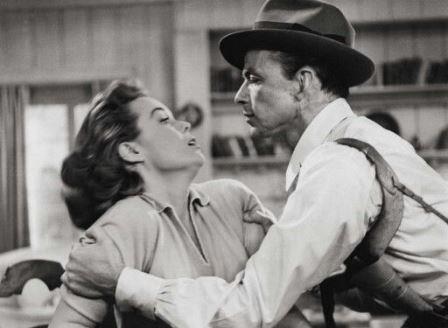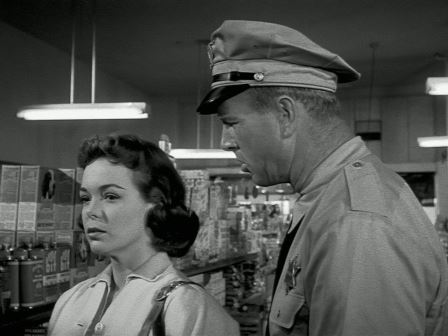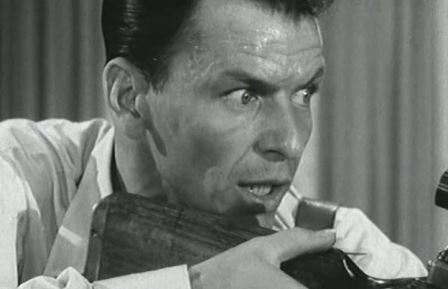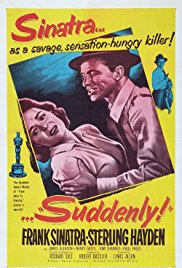“You know when you have a gun you ARE in a way sort of a god. If you had the gun, then you would be the god.”—Johnny Baron
The film Suddenly opens and closes with a motorist asking for directions and the name of the small Californiatown. In the beginning, when the first driver is told the name by the deputy sheriff, he responds, “Suddenly what?” “No,” corrects the officer, “that’s the name of the town.” Used to be a wild place, he says. “Things happen so slowly now, the town council wants to change the name to ‘Gradually’.”
The 1950s was one of the more distressed and anxious decades of the twentieth century. The trauma of World War II, though still lingering for many, was largely replaced by the Cold War and the new terror of possible nuclear annihilation. Horror films of a different nature emerged—not about regenerated monsters, mad scientists and prowling werewolves—but now about apparently ordinary people misbehaving monstrously, bent on their own annihilation and that of others.
Reminiscent of two other angst-ridden films about criminals taking over a household, such as The Dark Past(1948) and The Desperate Hours (1955), Suddenly is equally well-supported by all the players.
No one is seen “walking through” his part. It was among Frank Sinatra’s first strongly negative roles, and he is totally convincing as a cruel, psychotic thug; his violent outbursts always avoid any suggestion of over-acting. Sterling Hayden is stalwart as usual and astute in taunting the Sinatra character’s many flaws. James Gleason, often seen in comic or companion-of-the-hero parts, is both crafty and sympathetic.
Hired, perhaps, by some crime syndicate (it’s not made clear), Johnny Baron (Sinatra) and his two accomplices, Benny (Paul Frees) and Bart (Christopher Dark), arrive in town. They know the President of the United States is to arrive by train and they pose as FBI agents, saying they need to occupy the Benson home.
 Ellen (Nancy Gates), a Korean War widow, and her eight-year-old son Peter “Pidge” (Kim Charney) live with her father-in-law “Pop” Benson (Gleason).
Ellen (Nancy Gates), a Korean War widow, and her eight-year-old son Peter “Pidge” (Kim Charney) live with her father-in-law “Pop” Benson (Gleason).
About the same time, real FBI agents arrive to secure the area before the arrival of the special five o’clock train. Local sheriff Tod Shaw (Hayden) accompanies the FBI chief, Dan Carney (Willis Bouchey) to check out the Benson home, situated on a hill overlooking the train station.
When Carney reaches for his gun, realizing Baron and his men aren’t FBI, Baron kills him, and in the scuffle Bart shoots Shaw in the left arm.
The criminals make the Bensons and Shaw their prisoners. They are here to assassinate the President, and the sniper’s rifle (a German Gewehr 43) that will soon be mounted on a metal table by a window affords an ideal view of the train station.
Later, Benny, sent out by Baron to scout the town, engages in a gunfight and is killed when the suspicious deputy sheriff (Paul Wexler) wonders how he knows about the one-time special train.
A TV repairman, Jud Kelly (James O’Hara), called earlier, arrives and becomes another prisoner. Later, an annoyed Baron tells him, “You came to fix the TV, so fix the TV.”
 While everyone waits for five o’clock, Baron brags about his Silver Star and killing Germans in the recent war, how he loves killing, especially if he’s paid, “just a guy making a living.” Shaw needles him, accusing him first of cowardice, then that he was probably court-martialed and received a Section 8. Shaw reminds Baron that none of the historical presidential assassins “got away,” but Baron boasts that he will.
While everyone waits for five o’clock, Baron brags about his Silver Star and killing Germans in the recent war, how he loves killing, especially if he’s paid, “just a guy making a living.” Shaw needles him, accusing him first of cowardice, then that he was probably court-martialed and received a Section 8. Shaw reminds Baron that none of the historical presidential assassins “got away,” but Baron boasts that he will.
As Kelly works on the TV, “Pop” suggests that, for a better reception, he should clamp the main plate lead to the metal leg of the table by the window. Kelly is confused—any decent TV expert wouldn’t have been—until he sees the 5,000-volt warning label on the back of the set.
“Pop” feigns a heart attack and when the boy retrieves the medicine from a bureau drawer, he finds the revolver his grandfather had loaded earlier. “Pidge” substitutes his toy cap pistol for the real one, placing it innocently on a table in front of everyone. Both “Pop” and Shaw recognize it as the real thing.
The boy brings a glass of water which “Pop” deliberately spills on the floor under the table. When Bart, anxious to look through the rifle sights, steps to the table, his feet in the water, he is electrocuted. His erratic reflexes fire the rifle continually, alerting the FBI agents who shoot back. Baron unplugs the TV, pushes the dead Bart off the table and shoots Kelly.
 As the train approaches the station, Baron gleefully peers down the sights, but the train passes through. “It didn’t stop!” he moans. “It didn’t stop!”
As the train approaches the station, Baron gleefully peers down the sights, but the train passes through. “It didn’t stop!” he moans. “It didn’t stop!”
Ellen grabs the revolver “Pidge” tosses across the floor and shoots Baron in the abdomen. Shaw takes the gun from her limp hand and shoots Baron again. “No . . . don’t,” he pleads in a childish whimper, “ . . . no . . . please, no . . . no . . . ,” then falls to the floor dead.
After Shaw has seen Ellen off in her car, another traveler pulls over, asking for directions and commenting on the town’s unusual name. “Oh, I don’t know about that,” the sheriff replies.
[embedyt] https://www.youtube.com/watch?v=o9JYx4dWfIk[/embedyt]
